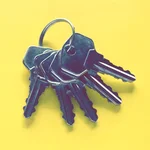

7 creative last-minute Valentine’s Day ideas
So here you are, with Valentine’s Day breathing down your neck… and you still don’t have a plan? No need to panic, here are a few low-budget ideas that can save the day!
Chipolo News
Fresh finding tips delivered straight to your inbox!
Home keys and car keys are repeatedly at the top of every ‘lost item’ list made.
It’s like they’re made to be lost; they’re small, we carry them with us wherever we go, we use them all the time and put them away in different places.


How many times have you found yourself in front of a locked home or car door, reaching into your pocket, only to find you’ve lost your keys again?
By now, you should have the ‘searching-for-my-lost-keys-again’ process down to a T, but just in case you’re one of those amazing people that don’t lose their keys often, here’s a few tips on how to do an organized search:
When we realize we lost our keys, the first instinct is to panic. And then we get angry at ourselves because it happened again. This might help us vent our frustrations, but it won’t help us do a focused and productive search for lost keys.
Instead, try to stay calm and start searching. Check the place where your keys are supposed to be. Sometimes, we just miss them the first time around and double checking might help you avoid unnecessary searches.


Professor Solomon theorizes that most lost objects (keys included) remain within 18 inches of their designated spot, they’re just a little off their usual location. He calls this 18-inch-wide zone the Eureka Zone.
Don’t waste time searching the same places repeatedly, just because the keys are supposed to be there. Instead search systematically and only move to the next room or space after you thoroughly searched the previous one.
An experiment at the University of Aberdeen in Scotland revealed that our eyes subconsciously focus on cleaner areas when we search. We do this even when it’s obvious that the keys we’re looking for are not there.
According to Anna Nowakowska, one of the researchers on the project, we should instead focus on the ‘…areas with the most clutter because if they were somewhere more obvious, you would have found them by now.’
Sometimes our brainpower alone is not enough, especially after a rough day.
Get a smart keyfinder, attach it to your keys and connect it to your phone. This way, you can use your phone to find your keys or use your keys to find your phone.
Finding lost keys can be especially challenging since we take them with us wherever we go. They change location at least a few times a day, every day!
The Chipolo offers a handy sharing feature to make the search easier for you and your family. You can share your tracker virtually through the app, so your family can help you search for your lost keys using their phones too.
Your mind is your greatest asset. Think about the moment when you last had your keys with you. Close your eyes and think about the location, what you were doing, what time it was, who you were with, what you were feeling…


The technical term for this is ‘context reinstatement' and it is a phenomenon that is successfully used with eyewitnesses to crimes, so finding your lost car keys should be a picnic in comparison.
But beware – in some cases, your mind can play tricks on you and introduce a false memory that will lead you in the wrong direction. Don’t overthink it!
It’s always easier to stop something from happening than it is to repair the damage after it’s already happened.
Clean up
Keeping a clean environment is highly effective when it comes to finding lost things, and also, seeing how tidy your home is, is bound to cheer you up.
Always put stuff in the same place
This one will take some willpower but force yourself to develop a habit and always put your keys (and other things) in the same place. Studies have shown that on average it only takes 66 days to form a habit, so give it a try!


Get Replacement Keys In Advance
This is not an all-around solution, since car keys, burglar-proof doors and anti-theft locks usually have expensive keys that sometimes require proof of ownership before a copy can be made. However, getting a copy of your basic door key isn’t that expensive or complicated, so do it.
Weigh the possibility of you permanently losing your keys against the hassle and expense of creating a copy in advance and decide which keys you should make a copy of. And if you do go for it, don’t forget where you stored the replacements!
Make it stand out
If it’s something small or inconspicuous make it pop with bright colors. Add a big colorful keychain to your keys or paint the bow of the key a color that stands out. Add a reflective patch to your wallet and put neon sticky notes on your documents.
Remember that most things eventually turn up, so if it’s not something you absolutely need right now, don’t worry about it.
It won’t help you find your keys, but it will help with your peace of mind.


So here you are, with Valentine’s Day breathing down your neck… and you still don’t have a plan? No need to panic, here are a few low-budget ideas that can save the day!


Behind the curtain of overpriced roses and chocolate, Valentine's Day is so much more interesting than it seems. Use these weird fun facts to impress your Valentine or...


Chipolo LOOP is a rechargeable tracking tag designed to find your essentials and elevate your finding experience at the same time. Explore the new colors and dive into...
Join our newsletter to get 10% off Chipolo POP, plus get weekly updates on deals, tracking tips and tricks, and a dash of fun.